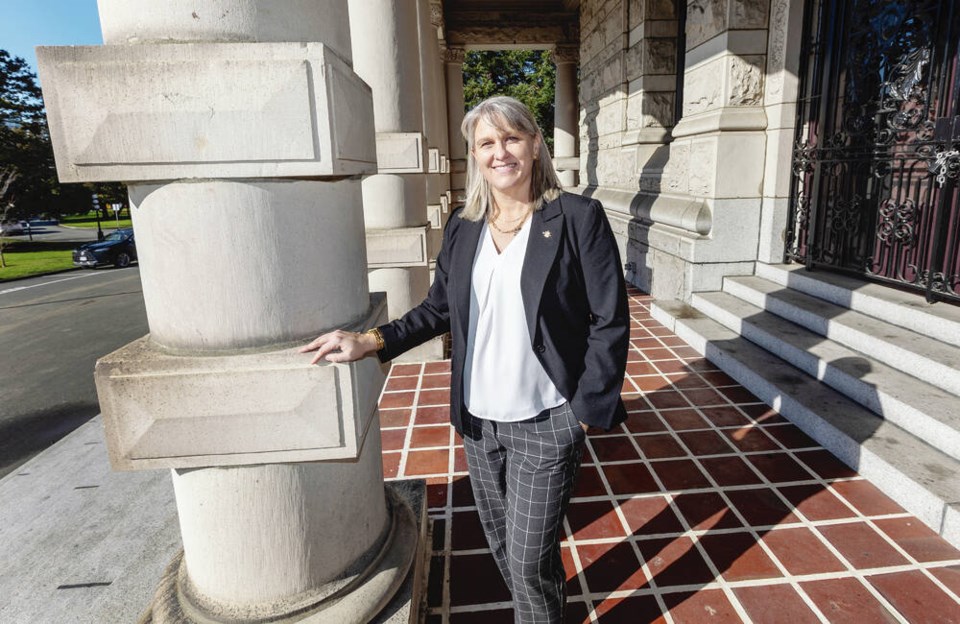You’d think it would be a great timing for B.C. MLAs to start a review of the province’s whistleblower protection law, just two weeks after a major scandal involving a whistleblower, leaked documents and a government-directed police investigation into Opposition public safety critic Elenore Sturko.
But you won’t hear a word about it from the all-party committee conducting a five-year review into the Public Interest Disclosure Act (PIDA). Because it turns out, the law utterly fails to apply to that concerning, important, real-life example.
There’s a variety of reasons why, ranging from the absurdly-high threshold of wrongdoing required for protection under the act, to the fact it doesn’t cover law enforcement officers (the government thinks Sturko’s whistleblower may be in policing, but Sturko denies this).
But the main problems are two critical things: The law only covers whistleblowers who come forward to the Ombudsperson (not MLAs, media, other agencies or even cabinet ministers), and almost none of the information shared by the whistleblower ever becomes public, even if it’s legitimate and in the public interest to know.
You might wonder what the use of the law even is, if the public doesn’t get to see the evidence, investigations or results.
To understand that, you have to go back to 2018 when PIDA was born out of the health ministry firings scandal, a long-running case in which the government received wrong information from a whistleblower, overreacted and wrongly fired eight health researchers. One person committed suicide.
The drafting of PIDA at the time seemed just as focused on setting a clear process for handling whistleblower complaints properly, as it did with actually understanding and protecting whistleblowers.
Five years later, the law now covers almost all current and former employees of core government, Crowns, health authorities, schools and other public-sector agencies. But it’s hard to tell if it’s actually working.
Of 223 “disclosures” by whistleblowers to the Ombudsperson since 2019, 24 per cent resulted in an investigation. Of those 53 investigations, only one was disclosed to the public—a 2024 report into how 64 jobs were improperly awarded to political staff over more-qualified public servants.
Many cases, instead, resulted in “advice” from the Obudsperson’s office, including whether the whistleblower’s allegations met the absurdly high threshold of actually breaking a provincial or federal law, involved a “serious misuse of public funds or public assets,” involved “gross or systemic mismanagement” or endangered the life, health or safety of people or the environment.
A whole bunch of important things you might think whistleblowers should be protected for blowing the whistle on do not meet that threshold, including: Evidence that politicians are lying, politicians misleading the public about a policy or program, inappropriate political interference into government operations, political incompetence, misdirection, cover-ups, patronage and more.
Under the existing law, the Ombudperson is not allowed to investigate any of that.
A good example of that is the Sturko case. Someone leaked her an internal health ministry presentation that showed government was aware its prescription safe-supply opioids were being trafficked in significant quantities by organized criminals—a claim politicians who crafted and defended the safe supply program had for two years denied.
Within days, an embarrassed government reversed its safe-supply rules to try and curb diversion. And then a top official in the public safety ministry quietly ordered the RCMP to investigate the whistleblower. Sturko has since been questioned by the anti-corruption squad, and accused government of a witch hunt to put a chill into future whistleblowers.
Some questioned why Sturko didn’t direct the person with the document through the proper legal channels, to give them protection from government reprisal.
But a review of the law shows that would have been useless. The public would never have been allowed to see the documents in question, and the offence (politicians not being honest) doesn’t meet the threshold to investigate anyway.
The value of the document Sturko made public is not in question—it contained information the public deserved to know about the impact of an important program in which politicians were saying one thing but internal evidence showed another. Its release directly led to a public policy change.
It sounds like exactly the kind of important public-interest disclosure that B.C.’s whistleblower law should protect. Maybe MLAs reviewing the act should stop and ask why it doesn’t.
Rob Shaw has spent more than 17 years covering B.C. politics, now reporting for CHEK News and writing for The Orca/BIV. He is the co-author of the national bestselling book A Matter of Confidence, host of the weekly podcast Political Capital, and a regular guest on CBC Radio.
[email protected]
🚨New newsletter alert! Stay ahead of the curve in B.C. politics. Get expert political analysis delivered straight to your inbox, plus inside scoops and other stories from across the province. Sign up here for the Capital & Coast newsletter


